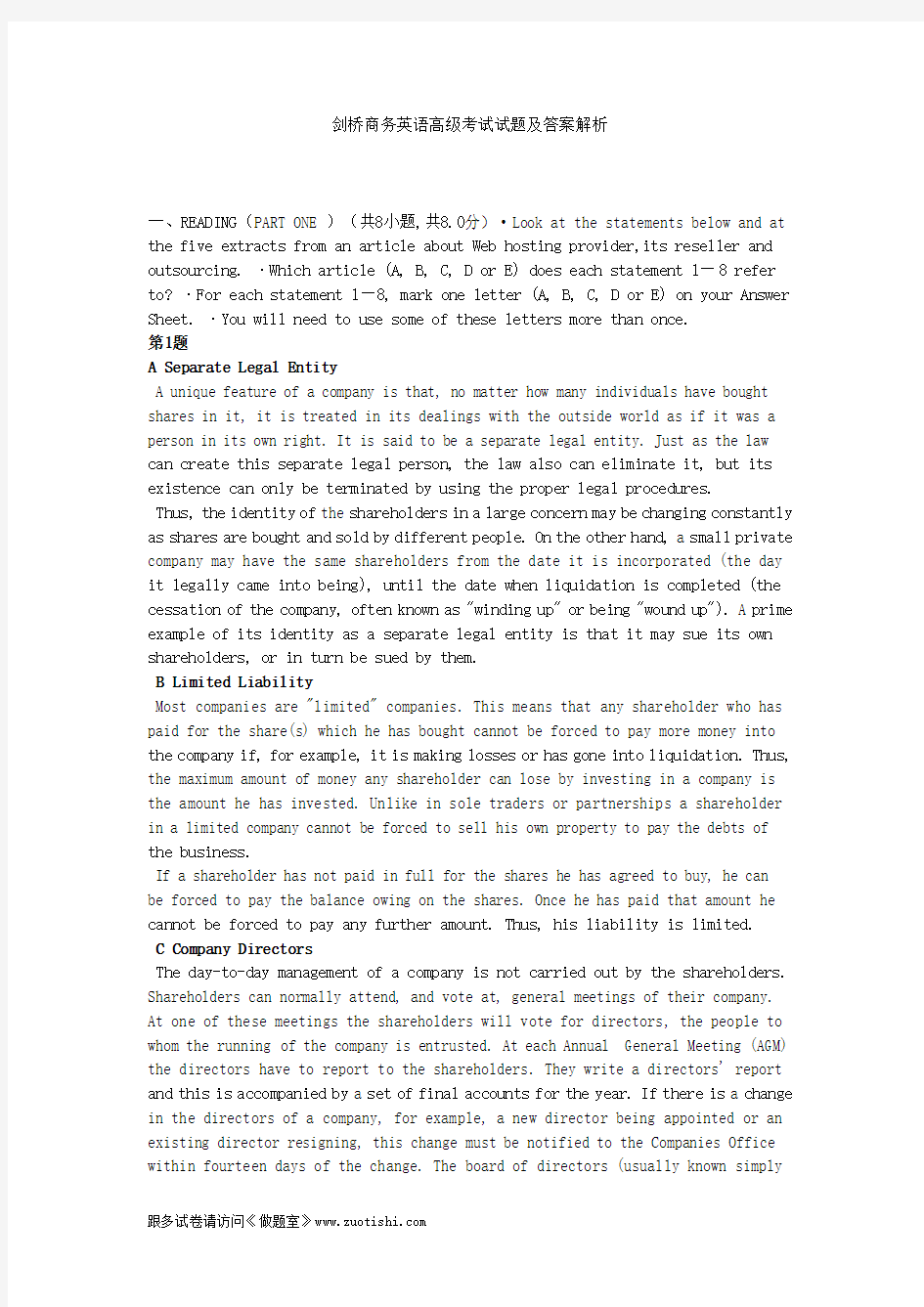

剑桥商务英语高级考试试题及答案解析
一、READING(PART ONE )(共8小题,共8.0分)·Look at the statements below and at the five extracts from an article about Web hosting provider,its reseller and outsourcing. ·Which article (A, B, C, D or E) does each statement 1—8 refer to? ·For eac h statement 1—8, mark one letter (A, B, C, D or E) on your Answer Sheet. ·You will need to use some of these letters more than once.
第1题
A Separate Legal Entity
A unique feature of a company is that, no matter how many individuals have bought shares in it, it is treated in its dealings with the outside world as if it was a person in its own right. It is said to be a separate legal entity. Just as the law can create this separate legal person, the law also can eliminate it, but its existence can only be terminated by using the proper legal procedures.
Thus, the identity of the shareholders in a large concern may be changing constantly as shares are bought and sold by different people. On the other hand, a small private company may have the same shareholders from the date it is incorporated (the day it legally came into being), until the date when liquidation is completed (the cessation of the company, often known as "winding up" or being "wound up"). A prime example of its identity as a separate legal entity is that it may sue its own shareholders, or in turn be sued by them.
B Limited Liability
Most companies are "limited" companies. This means that any shareholder who has paid for the share(s) which he has bought cannot be forced to pay more money into the company if, for example, it is making losses or has gone into liquidation. Thus, the maximum amount of money any shareholder can lose by investing in a company is the amount he has invested. Unlike in sole traders or partnerships a shareholder in a limited company cannot be forced to sell his own property to pay the debts of the business.
If a shareholder has not paid in full for the shares he has agreed to buy, he can be forced to pay the balance owing on the shares. Once he has paid that amount he cannot be forced to pay any further amount. Thus, his liability is limited.
C Company Directors
The day-to-day management of a company is not carried out by the shareholders. Shareholders can normally attend, and vote at, general meetings of their company. At one of these meetings the shareholders will vote for directors, the people to whom the running of the company is entrusted. At each Annual General Meeting (AGM) the directors have to report to the shareholders. They write a directors' report and this is accompanied by a set of final accounts for the year. If there is a change in the directors of a company, for example, a new director being appointed or an existing director resigning, this change must be notified to the Companies Office within fourteen days of the change. The board of directors (usually known simply
as "the board") is the term used to mean all of the directors.
D The Company Secretary
The company secretary must, among other things, attend all board meetings, consult with the chief executive on the agenda and keep a record of the minutes of board meetings and general meetings of the shareholders. It is normally the company secretary who makes returns to the Companies Office including notifying the Registrar of changes in the company's board, auditors, registered office etc. The company secretary is usually an individual although many companies pay firms of accountants to undertake this role.
E Share Capital and Dividends
A shareholder in a limited company obtains his reward for investing in the form of a share of the profits made by the company, known as a dividend. The directors decide how much of the profits is to be retained in the company and used for expansion. Out of the remaining profits they propose the payment of a certain amount of dividend. The shareholders cannot propose a dividend for themselves higher than that already proposed by the directors. They can, however, propose that a lesser dividend should be paid, although this action is very rare. If the directors propose that no dividend should be paid, then the shareholders are powerless to alter the decision.
The decision by the directors as to the amount proposed as dividends is a very complex one and such matters as the effect of taxation, the availability of bank balances to pay the dividends, the possibility of take-over bids and so on will all be taken into consideration.
No matter how many individuals have bought shares in it, it is treated in its dealings with the outside world as if it was a person in its own right.
【正确答案】:A
【本题分数】:1.0分
【答案解析】
[精析] 本题意为:不管有多少人买卖股票,它都像个体一样,和外面世界交易。在A文中能找到原句,故答案为A。
第2题
The shareholders cannot propose a dividend for themselves higher than that already proposed by the directors.
【正确答案】:E
【本题分数】:1.0分
【答案解析】
[精析] 本题意为:股东拿到的分红不会比董事们拿到的分红高。在E文中能找到原句,故答案为E。
第3题
The identity of the shareholders in a large concern may be changing constantly as shares are bought and sold by different people.
【正确答案】:A
【本题分数】:1.0分